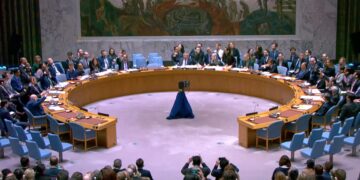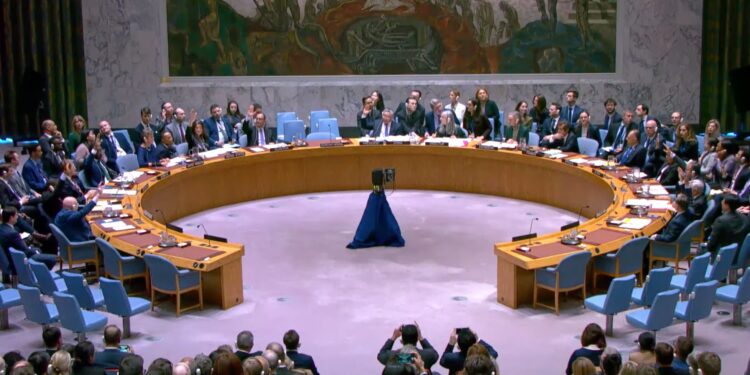New York – The United Nations Security Council (UNSC) has adopted Resolution 2774 (2025), calling for an end to the war in Ukraine, as the United States and African nations played a key role in securing the vote.
The resolution passed with 10 votes in favour, none against, and 5 abstentions (Denmark, France, Greece, Slovenia, and the United Kingdom), reflects a shift in U.S. policy toward a diplomatic approach to resolving the crisis, with strong backing from African nations, Guyana, and other non-European members of the Council.
United States Leads Push for a Peace Resolution
The United States, which introduced the resolution, described it as a “symbolic first step” in the pursuit of peace, acknowledging that while it does not end the war, it creates a foundation for negotiations.
The U.S. representative emphasised the urgent need to stop “the bloodiest war on the European continent since 1945” and urged all members to support diplomacy over prolonged conflict.
“This resolution puts us on the path to peace,” the U.S. representative stated.”The world is watching, and history will remember whether we stood for peace or allowed war to rage on.”
The U.S. push for a balanced resolution, rather than a direct condemnation of Russia, marked a significant shift from previous years, where Washington took a hardline stance against Moscow. This change was welcomed by several African nations, who have consistently advocated for a diplomatic resolution rather than military escalation.
African Nations Support Peace, Seek Inclusive Solutions
The three African members of the Security Council—Algeria, Mozambique, and Sierra Leone—voted in favour of the resolution, aligning with the U.S., China, Russia, and other non-European members.
Their position reflected Africa’s long-standing call for peaceful negotiations rather than prolonged military engagement.
Algeria’s representative reaffirmed Africa’s commitment to diplomacy, stating that his country voted in favour because “peaceful negotiations are the only path to a lasting solution.”
“Our position has been clear from the beginning: Peace is the only path forward. We cannot support indefinite conflict, nor can we endorse solutions that exclude one party from the table.”
Mozambique and Sierra Leone also backed the resolution, emphasising the importance of a neutral, balanced approach that acknowledges the concerns of all sides.
“We have seen too many wars prolong suffering. The lesson from Africa is that dialogue—however difficult—is the only lasting solution,” said Mozambique’s representative.
This vote aligns with Africa’s broader stance on global conflicts, where leaders have repeatedly rejected bloc politics and called for solutions that respect national sovereignty and international law.

Europe Remains Divided; U.K. and France Abstain
While the resolution passed, Europe’s divisions were on full display. The United Kingdom, France, Denmark, Greece, and Slovenia abstained, arguing that the text did not go far enough in holding Russia accountable for its invasion of Ukraine.
The U.K. and France wanted the resolution to explicitly name Russia as the aggressor, rejecting what they saw as a softened approach led by the U.S.
“There can be no moral equivalence between Russia and Ukraine,” said the UK representative. “Peace cannot be dictated by those who started the war.”
The French delegate emphasized that “peace must not mean capitulation”, stressing that a lasting agreement must protect Ukraine’s sovereignty.
Russia Welcomes U.S. Shift, China Advocates for Diplomacy
The Russian Federation, despite past tensions with the U.S., welcomed what it saw as a shift in Washington’s position, with its representative noting that the resolution “reflects the new U.S. administration’s desire to contribute constructively.”
“This text reflects a changing reality—one where even the United States recognises that endless war serves no one,” the Russian representative stated. “It is Europe, not the U.S., that is now pushing to continue hostilities.”
Meanwhile, China, which has maintained a neutral stance on Ukraine, also backed the resolution, stating that “the ultimate solution for any conflict lies at the peace table.”
A Turning Point for U.S.-Africa Relations?
The alignment between the U.S. and African nations on this resolution marks a notable moment in global diplomacy. In recent years, African nations have increasingly pushed back against Western pressure to take sides in geopolitical conflicts, favouring a balanced, non-aligned approach.
The U.S. vote in favour of a more neutral resolution, rather than a hardline stance, suggests that Washington is paying closer attention to African and Global South perspectives. This could strengthen U.S.-Africa relations as the Biden administration seeks to rebuild trust with non-Western nations.
While Resolution 2774 (2025) does not immediately end the war, it is the first major diplomatic effort by the Security Council in three years to address the conflict. The next steps will depend on whether the international community, particularly Russia, Ukraine, and Western allies, are willing to engage in serious peace negotiations.
For now, the resolution signals a shift toward diplomacy, with the U.S. and African nations playing a crucial role in shaping the future of global peace efforts.








